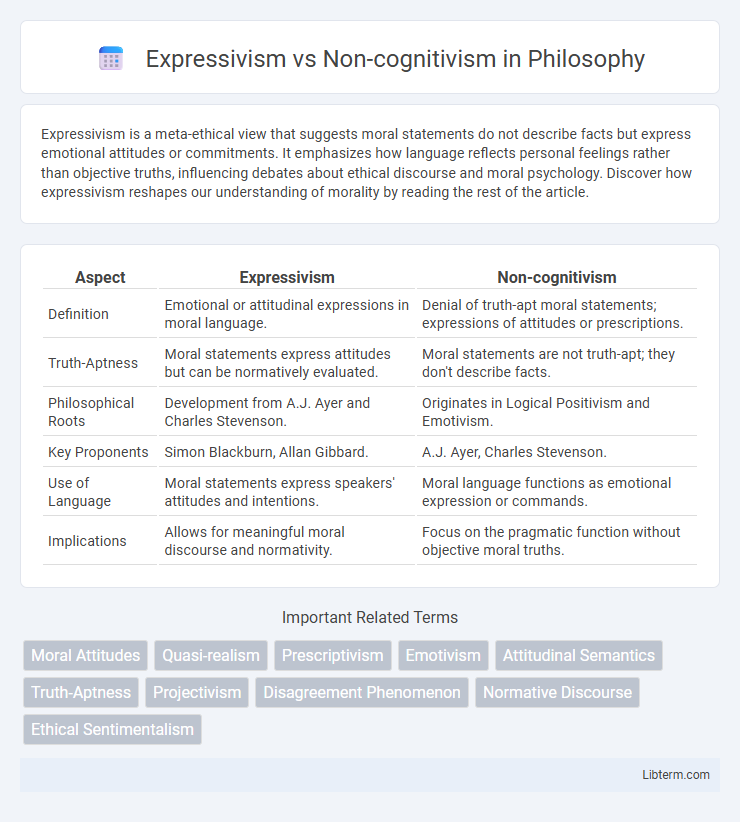Expressivism is a meta-ethical view that suggests moral statements do not describe facts but express emotional attitudes or commitments. It emphasizes how language reflects personal feelings rather than objective truths, influencing debates about ethical discourse and moral psychology. Discover how expressivism reshapes our understanding of morality by reading the rest of the article.
Table of Comparison
| Aspect | Expressivism | Non-cognitivism |
|---|---|---|
| Definition | Emotional or attitudinal expressions in moral language. | Denial of truth-apt moral statements; expressions of attitudes or prescriptions. |
| Truth-Aptness | Moral statements express attitudes but can be normatively evaluated. | Moral statements are not truth-apt; they don't describe facts. |
| Philosophical Roots | Development from A.J. Ayer and Charles Stevenson. | Originates in Logical Positivism and Emotivism. |
| Key Proponents | Simon Blackburn, Allan Gibbard. | A.J. Ayer, Charles Stevenson. |
| Use of Language | Moral statements express speakers' attitudes and intentions. | Moral language functions as emotional expression or commands. |
| Implications | Allows for meaningful moral discourse and normativity. | Focus on the pragmatic function without objective moral truths. |
Introduction: Defining Expressivism and Non-cognitivism
Expressivism and Non-cognitivism are two influential theories in meta-ethics that explain the nature of moral language and judgments. Expressivism holds that moral statements express emotional attitudes or intentions rather than report factual information, emphasizing the expressive function of ethical discourse. Non-cognitivism broadly asserts that moral claims do not convey truth-apt propositions but function to influence attitudes or behaviors, highlighting the non-descriptive role of moral language.
Historical Background and Philosophical Foundations
Expressivism and Non-cognitivism both emerged from early 20th-century analytical philosophy, addressing the nature of moral language and its meaning. Expressivism, notably advanced by A.J. Ayer and later Simon Blackburn, views moral statements as expressions of emotional attitudes rather than statements of fact, rejecting truth-conditional semantics. Non-cognitivism, rooted in the emotivism of Charles Stevenson and the prescriptivism of R.M. Hare, holds that moral language primarily functions to influence behavior or express commands, emphasizing the performative aspect of ethical discourse.
Key Differences between Expressivism and Non-cognitivism
Expressivism asserts that moral statements express the speaker's attitudes or emotions rather than describe objective facts, emphasizing the communicative function of language. Non-cognitivism broadly denies that moral claims have truth values, treating them as expressions of approval or disapproval without cognitive content. The key difference lies in expressivism's focus on expressing attitudes with a complex representational role, while non-cognitivism strictly interprets moral language as non-factual and non-truth-apt.
Major Proponents and Influential Works
Expressivism, championed by philosophers like A.J. Ayer and Simon Blackburn, is prominently articulated in Blackburn's "Spreading the Word" (1984), emphasizing moral statements as expressions of emotional attitudes rather than factual claims. Non-cognitivism, closely related and developed by A.J. Ayer in "Language, Truth and Logic" (1936), denies that ethical sentences have truth value, focusing instead on their role in expressing approval or disapproval. Both positions challenge traditional moral realism by rejecting the notion that moral judgments report objective facts, fundamentally shaping metaethical discourse.
The Role of Language in Expressivist and Non-cognitivist Theories
Expressivism views language as a means to express emotional attitudes or commitments rather than state truths, emphasizing the role of evaluative language in conveying subjective experiences. Non-cognitivism similarly treats moral language as non-descriptive but focuses on its function to influence behavior or attitudes, often analyzing imperatives or commands in ethical discourse. Both theories challenge traditional truth-conditional semantics by prioritizing the pragmatic and expressive functions of moral language over representational accuracy.
Moral Judgments: Expression or Attitude?
Expressivism interprets moral judgments as expressions of an individual's attitudes or emotions rather than statements of objective fact, emphasizing the expressive function of ethical language. Non-cognitivism broadly holds that moral claims do not aim to describe the world but serve to communicate feelings, prescribe actions, or influence behavior, rejecting truth-apt moral propositions. The key distinction lies in Expressivism's focus on the expression of mental states underpinning moral discourse, while Non-cognitivism encompasses a wider array of theories about the non-descriptive role of moral language.
Criticisms and Challenges Faced by Expressivists and Non-cognitivists
Expressivism faces criticism for its difficulty in explaining the truth-aptness of moral statements, as critics argue it struggles to account for how moral discourse can be subject to rational debate or disagreement. Non-cognitivism faces challenges in handling the logical structure of moral language, specifically in explaining the apparent logical relations between moral statements without attributing truth-values. Both theories confront the Frege-Geach problem, which questions how non-cognitive attitudes can be embedded within complex sentences while preserving their original meaning and logical consistency.
Implications for Moral Discourse and Debate
Expressivism and non-cognitivism both challenge the notion that moral statements express factual beliefs, influencing moral discourse by framing ethical discussions as expressions of attitudes rather than objective truths. This perspective shifts moral debate from seeking empirical validation to negotiating emotional and social commitments, impacting how consensus and disagreement are understood. The implications include a focus on persuasion and emotional engagement, highlighting the pragmatic and social dimensions of ethical communication rather than purely logical argumentation.
Contemporary Developments and Hybrid Theories
Contemporary developments in metaethics have seen the emergence of hybrid theories that blend expressivism and non-cognitivism to address previous criticisms such as the Frege-Geach problem and the challenge of moral discourse's logical consistency. These hybrid approaches integrate expressive functions of language with cognitivist elements, allowing moral statements to both express attitudes and participate in logical inferences. Key figures like Simon Blackburn and Allan Gibbard have advanced quasi-realism and norm-expressivism, respectively, demonstrating how moral language can maintain normative force while accommodating the semantic insights of non-cognitivism.
Conclusion: Evaluating the Future of Expressivism and Non-cognitivism
Expressivism offers a compelling framework by linking moral language to expressions of attitudes, yet faces challenges addressing moral objectivity and disagreement. Non-cognitivism, emphasizing the emotive and prescriptive function of moral statements, struggles with explaining moral reasoning and truth conditions. Future developments depend on refining these theories to better accommodate moral realism while preserving the insights into the motivational and practical aspects of ethical discourse.
Expressivism Infographic

 libterm.com
libterm.com